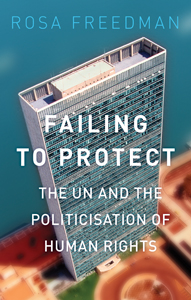Book presentation and signing
The United Nations Human Rights Council: A Critique and Early Assessment by Rosa Freedman

The United Nations Human Rights Council – A Critique and Early Assessment, Dr Rosa Freedman
The Permanent Mission of the United Kingdom of Great Britain and Northern Ireland to the United Nations Office and other international organizations in Geneva
About the book
The United Nations Human Rights Council was created in 2006 to replace the UN Commission on Human Rights. The Council’s mandate and founding principles demonstrate that one of the main aims, at its creation, was for the Council to overcome the Commission’s flaws. Despite the need to avoid repeating its predecessor’s failings, the Council’s form, nature and many of its roles and functions are strikingly similar to those of the Commission. This book examines the creation and formative years of the United Nations Human Rights Council and assesses the extent to which the Council has fulfilled its mandate. International law and theories of international relations are used to examine the Council and its functions. Council sessions, procedures and mechanisms are analysed in-depth, with particular consideration given to whether the Council has become politicised to the same extent as the Commission. Whilst remaining aware of the key differences in their functions, Rosa Freedman compares the work of the Council to that of treaty-based human rights bodies. The author draws on observations from her attendance at Council proceedings in order to offer a unique account of how the body works in practice.
About the author
Rosa Freedman completed her undergraduate studies at Queen Mary University of London and her LLM in Public International Law at University College London. She was called to the Bar at Gray’s Inn before beginning her doctoral studies, which was funded by the University of London. Rosa started working at Birmingham Law School in 2011. She has published academic articles on international law, international human rights law and international institutions. Her research is interdisciplinary, focus-ing on law, international relations and post-colonial studies. Rosa also writes comment pieces on a wide range of legal matters for The Guardian, Huffington Post and UK Human Rights Blog. She provides research and expertise to a number of national and international NGOs.
Tuesday, 28 May 2013, at 13:00
UNOG Library Events Room (B-135)• Palais des Nations, Door 20, 1st floor • Geneva, Switzerland
Light refreshments will be served. Kindly confirm your participation at libraryevents@unog.ch


